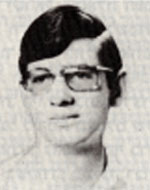Nathaniel, son of Rachel and Gershon, was born on September 19, 1953 in Tel Aviv, the second of three children. From the beginning of his childhood he had been plagued by agony and long illness and had been lying in bed for very long periods of time. Even then he was characterized by the qualities that characterized him throughout his life, endurance and strong spirit, even in the most difficult situations. Although he was a tender child in the years – he was about five at the time – he realized that his condition was very serious, but he did not indulge in indulgence for a moment. On the contrary, he always gave his surroundings tranquility and good spirits. From the beginning of his studies at the Graz elementary school in Tel Aviv, his health improved considerably, and he managed to maintain a regular school schedule, where he bought many friends, some of whom maintained close ties with him until his fall. From the moment he could read, reading became a constant for him, and he was interested in every piece of printed paper that fell next to him. Reading seemed to serve as a window to other worlds, to gather information about places, processes and actions, and over the years became interested in social and technical issues as well. At school, he was involved with the students and, as mentioned, acquired friends but was never among the participants in pranks or provocations. He always kept his composure and peace of mind and even used to reconcile hawks with a smile and a good word. He seemed to have acquired the hearts of his friends by virtue of the same serenity and quietness, of gentleness and good manners, which he had observed before both adults and small ones. At the end of his elementary studies he turned to the professional track with the intention of completing his theoretical knowledge at a later stage. He studied at the “Shevach” vocational school in Tel Aviv and successfully completed his studies at this institution. During his studies at the institution, where students from all walks of life and groups gathered, his political and social consciousness became more acute and despite his youth, he knew his healthy instincts to correctly point out the social malady of the society and within the school was active in social struggles. Even in high school, as in elementary school, he acquired many friends and was deeply involved in the life of his class and the students’ lives. He was always willing to help his fellow students, opened his eyes to them and was willing to help with good advice and action. After completing his studies at the Shevach school, he decided to attend an external high school for matriculation and to take the matriculation exams to study engineering at the Technion in Haifa. And indeed, in that year of pre-enlistment, he studied and passed several matriculation exams. Although he suffered from health problems, he enlisted in the IDF in May 1972, and when he was drafted, he did not give any details about his health because he wanted to serve in the army without restrictions, and was sent to basic training in antiaircraft units. He was unable to continue in this framework and he was sent to a rear unit. Although he was offered to serve close to home, in convenient positions, he insisted on serving as a “soldier’s service,” as he called it, and after a long period of struggle and effort was assigned to the liaison corps. Within the context of the Signal Corps, he completed a professional course, which was considered one of the most difficult and complex in the Corps. At that time he was again hospitalized several times. His doctor, who treated him for many years, suggested that he give up his army service and be released for health reasons. But Nathaniel rejected the offer and insisted on continuing his service. No one was happier when he was assigned, after the vocational course, to an armored brigade. Although he served under difficult conditions, he was full of enthusiasm for the right she had given him, as he put it, to participate in creation from scratch. From his commanders and friends, we learn that he integrated into his unit and won the trust of his commanders thanks to his dedication and professional ability, and to his serious attitude toward the tasks assigned to him. With this brigade, he went to the Yom Kippur War. They crossed the canal to the west. On the last day of the Yom Kippur War, when a staff member of the Operations Branch of the brigade commander participated in an attempt to rescue the wounded who were trapped in the heart of the city of Suez without the possibility of withdrawing, Nathaniel and his friends, nine officers and soldiers, abandoned the armored half-track, and from then until the fall they do not know what happened to them. In his death, as in his life, his great readiness to help others, his openness and his sensitivity to people, his integrity and his willingness to stand on the right of every oppressed and beaten, pass through his death. For him, it was natural to volunteer for the task that led him to his death, knowing that its chances of success were small. All his life he fought for his life quietly and with great patience and endurance, and ended up giving his life to save the lives of others, and out of a deep belief that he was doing the right and only thing in the same circumstances. He was twenty years old, all he had left behind were his dreams that would never come true.
